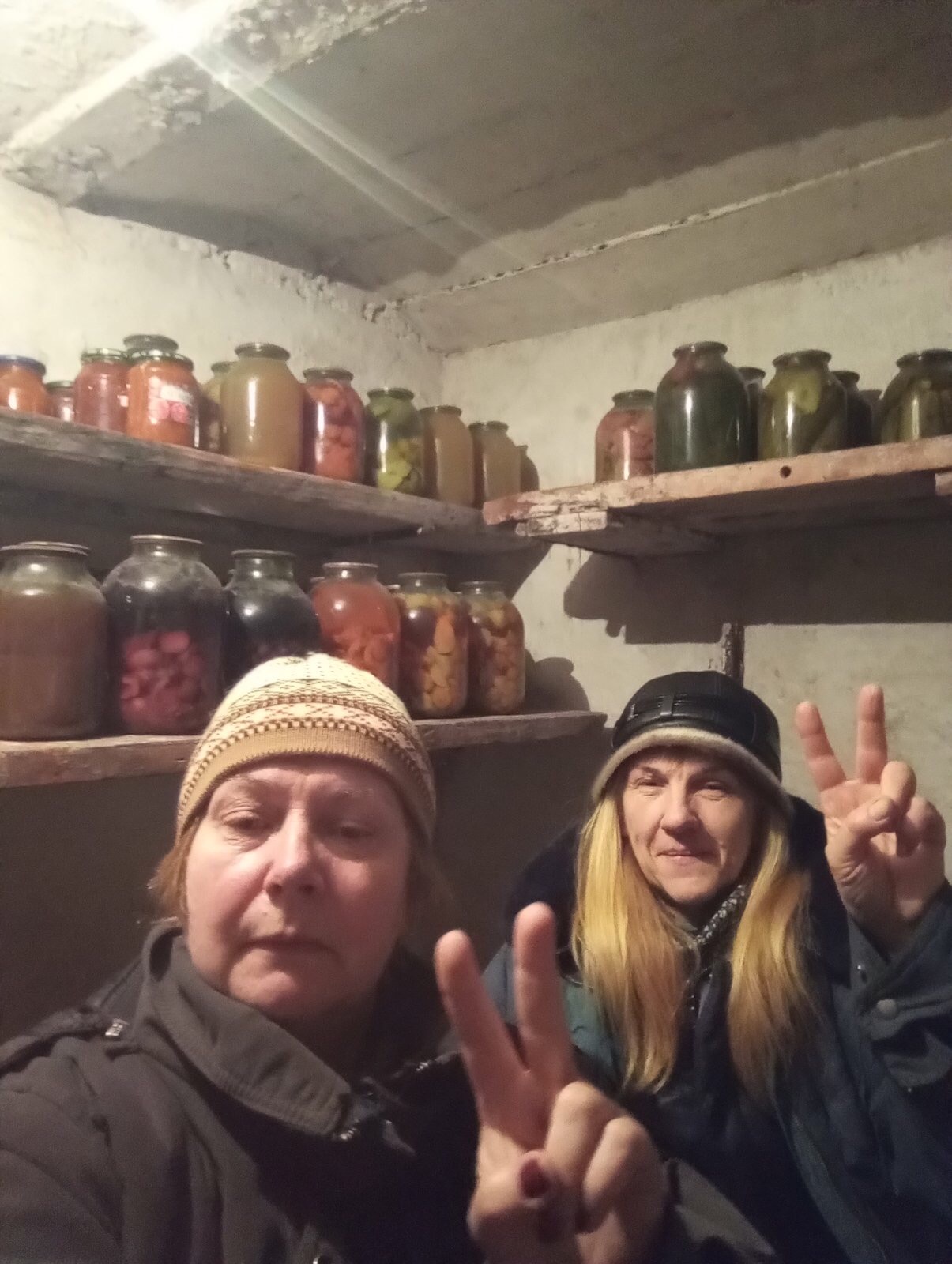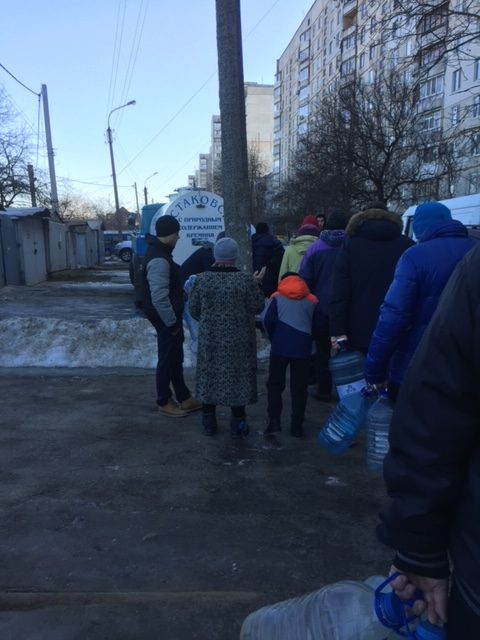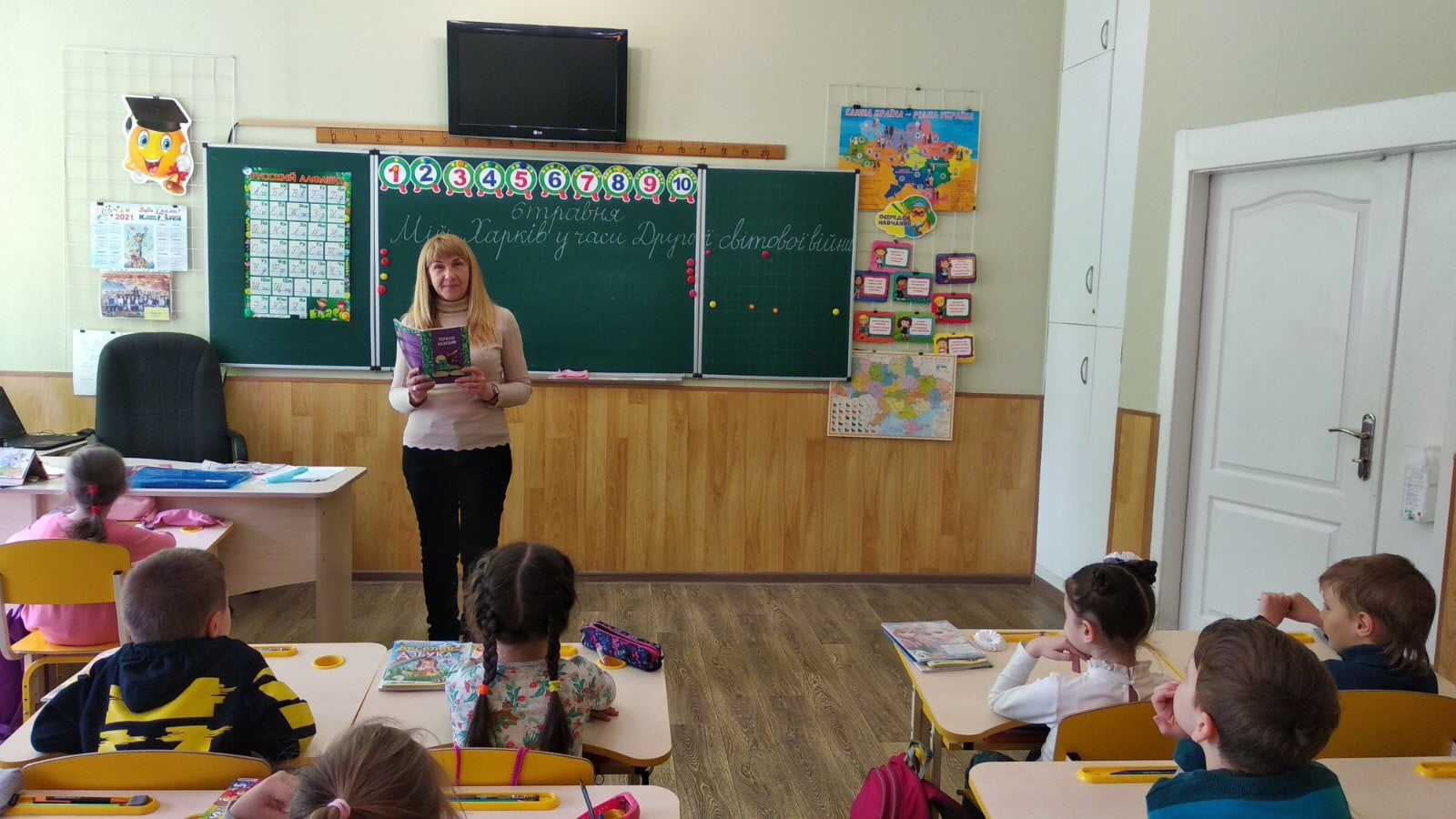Interview 12. Fairy Tale Therapy. Iryna Harmash
Psychologist Iryna Harmash tells us how she wrote fairy tales in the basement, managed to escape the shelling in Kharkiv, and what makes war trauma special.
“My brain works to create fairy tales, and I have a desire to tell them to an audience,” — says Iryna Harmash, a practical psychologist from Kharkiv School No.109. Living through the terrible conditions in the war, hiding in a shelter and hearing the ground shaking from enemy shelling, Iryna thought about how she could console the children. She wrote a fairy tale that would gently and, at the same time, correctly and accessibly explain what was happening to us and Ukraine. Fairy tales also help Iryna herself, acting as a source of strength and inspiration during the war. She is convinced that art therapy will be in demand even after the war when Ukrainians try to recover from the injuries and trauma inflicted by the enemy.
The main lesson
With the beginning of the war, I had to reassess my values. Peace, human life, our country and unity have become of paramount importance. I am a practical psychologist; I work in a school. Various people turn to me and often ask me about the meaning of life. I came to understand that the meaning of life is life itself. A peaceful, calm life; our children, our country and mutual assistance.
The first shock
On February 24, I woke up to the neighbors making a lot of noise on the floor below. It was half past five, and someone was banging somewhere. My son called me and said that the war had started. Probably, like everyone else, I turned on the TV and switched on the Internet to find out what was happening. But, there was little clear information. I was confused; I thought about going to work, but the director canceled the workday.
I decided to go to see a friend who had invited me to her house. She was scared; she has an old mother and many animals that she helps, as well as four dogs of her own. She feeds the animals of neighbors who have left, and takes care of a dozen cats. I moved to her place with my cat. I am a thrifty woman, so I had a lot of cereals, pasta, oil and meat left at home. We took this food to my friend’s place, accompanied by the roar of explosions somewhere in the distance. When we visited the apartment a few days later, we were struck by the silence. There were hardly any people around, and the elevators did not work. There were packages of food by the front door; residents had left them for others.
At first, I didn’t want to run away from Kharkiv. I was in constant expectation and stress. We all expected the war would end soon and we would gain a quick victory. My partner kept saying that one more week and we will be victorious. But, the shelling was terrible. Missiles flew past our house, and we saw fires glowing nearby. As soon as we heard a noise, we ran into the basement. We sat among preserves and bags of potatoes.
To distract ourselves, my friend and I remembered positive events from the past, because we have been friends for many years. We hear the shelling, but we continue laughing. Then, I realized this was some kind of emotional release. The primary emotion – fear – turns into aggression, and we all hated the enemy very much. Hate is followed by a kind of relaxation – either through joy or sadness. I felt a wild fluctuation of emotions within me.


To distract ourselves, my friend and I remembered positive events from the past, because we have been friends for many years. We hear the shelling, but we continue laughing.

A tale from the basement
Compared to what our defenders, volunteers, and doctors do every day, my contribution to our victory is a very small drop in the ocean. But, there are many of us. Today, every Ukrainian, every life is important. My contribution is fairy tales, of which 17 were born during the war period from February 24. I started writing the first one back in Kharkiv in that basement. I knew that mothers, their children and teachers were also sitting in basements and that they somehow needed to tell the children, especially the little ones, about the war and explain what was happening.
My tale is about a mother and two children hiding in a shelter while their father defends the country. The mother tells the child a fairy tale about the war, about an evil witch’s war coming to the land of the good Ulves. The children ask why the ruler of the evil land of rulvia started the war, and the mother answers – because the Ulves wanted to be independent and self-sufficient, wanted to go their own way, and make friends with whoever they wished. Also, the Ulves loved to sing their country’s song and adored their flourishing, beautiful land. When the war began, it was very difficult for the Ulves, but surprisingly, all the neighboring countries came to help, and all together, they drove away the evil witch. She returned home angry and wounded, attacked her ruler and the evil died. I tried to describe the events in my story properly, because the most important thing in fairy-tale therapy is not to harm the listeners.
Educational front
Kharkiv and the region held on bravely under continuous enemy attacks. All this time, educational institutions continued to provide online lessons for our children. The graduation was also held – one of the most poignant moments was the waltz of the graduates of Kharkiv School No.134 against the background of the destroyed building. In Kharkiv Region, the authorities plan to start a new academic year and, despite the hostilities, they will admit students to educational institutions.
In order to help Ukrainian educators to continue teaching children during the war, the EdCamp Ukraine community launched a crowdfunding campaign — collecting funds for computer equipment and Internet access for teachers who lost their pedagogical equipment in the war. The funds will be used for psychological support for teachers and to organize conferences where they can share their pedagogical experiences during the war. Both foreign colleagues – on the GoFundMe platform, and Ukrainians – on the EdCamp Ukraine page, can join the campaign by adding the comment My War. Lessons to the payment.
Uniting in terrible times
At the beginning of the war, when every day was terrifying, many of my relatives said that it looked like some kind of bloody action movie. Today, I think it is more like a film about the heroism of Ukrainians, about how we help each other. It is a film about national unity.
I am witness to the heroism of the whole country. The teachers from our school, who remained in Kharkiv, worked together on Saturdays, regardless of the air raid sirens, and cleaned up the area near the school. Our communal workers continue working, our soldiers protect us, our volunteers help others, and I am grateful to everyone.
The long way to safety
My friend and I slept in our clothes and shoes, kept the window open in order to hear what was happening. We were always ready to get up and run down to the basement. The building shook in the nightly shelling. In the morning, we discovered that the water supply had been turned off. It began snowing, and we decided that we would have to melt it down for water. A friend suggested that I leave Kharkiv, because there could be further problems with water and food.
My colleague, who was getting ready to leave, said that people were departing from the South Train Station. She advised me to take a small suitcase or bag, because there was very little room in the train. I packed, took what I was wearing and some small packages and went to the station – from Kholodna Hora on foot in the snow, because the roads had not been cleaned. Half an hour later, I met a car with military personnel. I asked for a ride to the station, and they helped me. As they say, God paved the way for me.
There was a massive crowd at the station. But, as soon as I entered the station, an employee added me to a group of women and children who were being sent to Lviv. We switched from one track to another five times. There were also men, some of whom were added to our group when their children cried for their father. An Intercity train with two wagons arrived; there were so many people. But somehow, we managed to board the train; we took turns sitting and standing. Small dogs and cats traveled on their owners’ laps. We all helped a woman from Pivnichna Saltivka who had nothing except her passport, because she had fled in the clothes she was wearing. We were lucky, as we traveled only 20 hours to Lviv, while my colleague traveled sitting in an overcrowded wagon for 30 hours.
War traumas
Now that I have watched many seminars by crisis psychologists and trauma therapists, I have begun to understand what has happened to us. At the beginning of the war, feelings of anxiety, fear, misunderstanding and confusion dominated. In humans, the reptilian brain first reacts to stress, and the limbic system kicks in later. Because we are herd animals, we need other people to calm down. Therefore, during the first month, people communicated a lot, called relatives, friends, colleagues, and even simple acquaintances, because they needed other people. Today, that period of time is a fog in my head.
A certain sense of helplessness overcomes people who, for example, are afraid to leave the subway even in safe periods. A person thinks he has found a safe haven and begins to feel a little better. But, they develop a fear of fear. These are the traumas of war that we did not have before.
If you witness the trauma of other persons – either psychological or physical, or you see the destruction on the news – this is called witnessing trauma. When people talk about their war experiences, on the one hand, they share emotions and alleviate their discomfort and anxiety; on the other hand, it is a psycho-emotional trauma that increases the witnessing trauma. Many people experience survivor’s guilt syndrome. People who are safe worry about those who are under fire. I can say that I felt it too.
When I came to live with my relatives in Lviv Region, I first slept a lot and got used to the fact that the city was calm; there were medicines in pharmacies and food products in stores. Then I was sick for three weeks because the stress affected my health. My colleague, who left Kharkiv under shelling, said that she has gone through all the stages of grief.
I am currently studying a course called Art therapy for children affected by PTSD. It will be needed even after the war, because there will be a lot of work for psychologists. But, this requires particular specialists. Although I have a lot of practical experience, I do not have the knowledge to work with people traumatized by war (those who survived torture, sexual violence, the military); special courses are needed. During the training, we were told that we should be familiar with trauma therapy, crisis psychology and be stable ourselves.


: If you can live, then live; otherwise, why is this war happening? Our task is not to trouble others, not to distract doctors, but to live peacefully and pray for victory.

Concern for relatives
Since I am a psychologist, I do not teach at the school. But, I communicate with people who need help. Students, parents, and teachers call me. Many people have left the city; children study in different places. People turn to me because they are worried about their relatives; they are more concerned about them than about themselves, especially if the relatives remained in dangerous areas. One colleague left with her children and grandchildren, while her husband remained in Kharkiv and helped his old father. She needed support to understand her husband and avoid family conflicts. It is important not to hurt each other during such a traumatic time.
Feeding the white wolf
I would urge the teachers of other countries to teach humanity and kindness to their children. I would tell them – continue developing your own skills, believe in your children, in the development of their abilities and talents, and do everything you can to nurture humanity and kindness in each child. I like Bernard Shaw’s phrase: “Now that we have learned to fly the air like birds, swim underwater like fish, we lack one thing – to learn to live on earth as human beings.”
The parable of two wolves, white and black, helps me a lot in working with children. The soul of every person is the theatre of a life-long struggle. It is very similar to the battle between two wolves. The black wolf represents evil, envy, jealousy, anger, selfishness, and other bad qualities. The white wolf is goodness, peace, love, loyalty, and other good traits. And the wolf you feed always wins.
I sometimes communicate with children using the language of this metaphor. When they quarrel, I ask them which wolf is winning, which one is being fed? I created the game Feeding the white wolf. We work with the silhouettes of two wolves; I list the qualities, actions, deeds, and the children pick up the wolf they want to win.
I want to share my fairy tales with many people. I have a tale about internally displaced persons, about fears and how to work with them, and about our people’s heroism. I really like the fairy tale – Flames of light; Flames of goodness, which in June won the international competition of spring fairy tales – Koshyk Slovotsvitu (Basket of word blossoms). May everyone enjoy such light and goodness! It would be better if they were in every person, especially in our northern neighbor. I believe that other countries should follow our example and feed the white wolf.
Text — Halyna Kovalchuk.
The interview series My War. The Lessons was prepared with financial support from the Black Sea Trust for Regional Cooperation – a project of the German Marshall Fund of the United States.
The views and opinions expressed are those of the author and do not necessarily reflect the official policy or position of EdCamp Ukraine and the Foundation.










